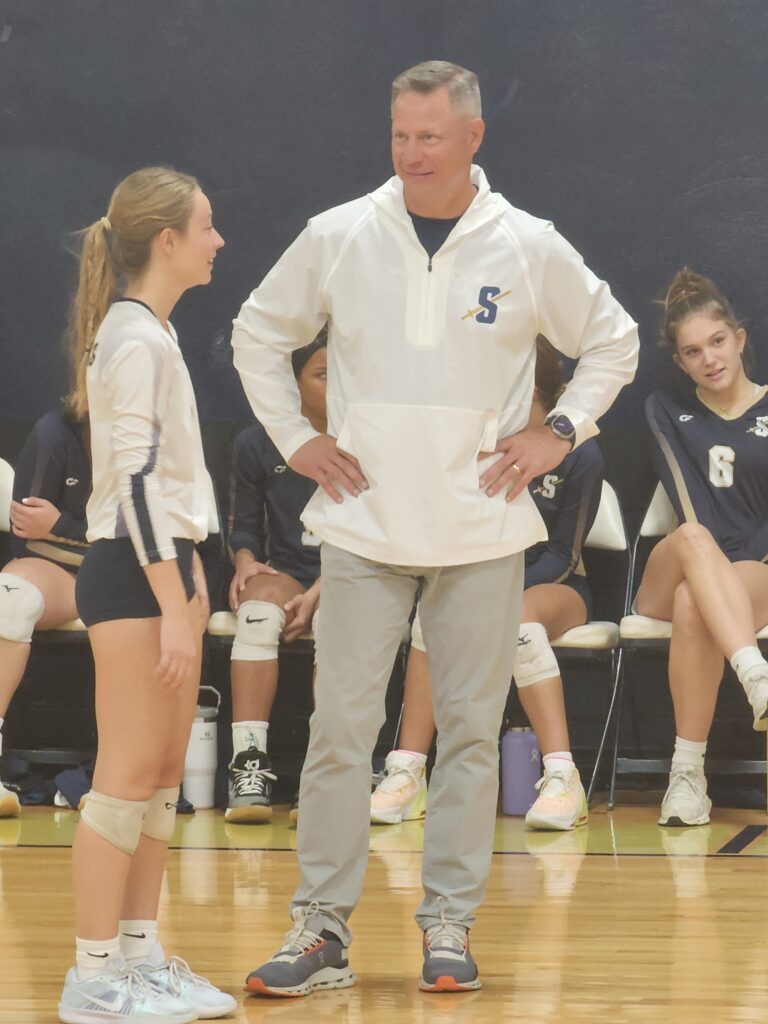By C. Eric Plumlee
SBS Board Chairman
Literature indicates and the statistics are overwhelming that growing up in a household without a father many times leads to a child’s negative well-being and life adversity: depression, drug and alcohol abuse, anxiety, psychological issues, violence, and sexual and criminal activities. Author Bob Griffin declared, “The need for a father is on an epidemic scale, and the ‘Father Deficit’ should be treated as a public health issue.” Undoubtedly, our society understands the incredible negative impact of an absent father, but what is more difficult to recognize is the immediate and long-term effects on an otherwise available, yet uninvolved father.
Nothing has brought me more joy over the years than being a father, and nothing has been more satisfying than having people comment on the relationship they see between my daughters and myself. I vacillate between humor and offense when strangers see my family in public, count heads and then astutely observe, “four girls, huh? I feel sorry for you.” “No, no.” I respond. “Don’t feel sorry for me. I’m the most blessed guy you’ve ever met.” I have been asked many times how I am so close to my daughters and how that has impacted who they are today. Those questions invariably generate the same answer: God has blessed me, my wife is amazing and I have great kids. Indeed, all those things are true, but there is also a more detailed response.

As believers, we are familiar with the countless references and models the Bible offers for earthly fathers and sons (children): Psalm 103:13; Proverbs 4:1-9; 3 John 1:4, etc., the many examples of fathers: Adam, Noah, Abraham, Isaac, Jacob, etc. and even a number of do’s and don’ts related to how we parent our children (Ephesians 6:4; Proverbs 22:6; Colossians 3:21, etc.). Notwithstanding, we must still acknowledge that even with Biblical guidance, there is no manual for parenting, and one size certainly does not fit all. How, then, do we as fathers practically impact our children’s lives?
I have been blessed with the opportunity to wear many hats over the years: husband, father, coach, family law attorney, substitute judge, school volunteer as well as some others, and each opportunity has offered a unique perspective on how a father’s involvement in a child’s life has a long-term, even a life-long, impact on the child’s wellbeing and long-term faith commitment. As I reflect upon my observations and experiences, a number of life lessons stand out.
A Model for Real Relationship
Fatherhood is all about real, meaningful relationships, not rules and regulations. It is true scripturally, and it is true earthly. Just as Christ calls us into a genuine relationship with Him, it serves as the model for how we are to be in relationship with our children. As we look at an earthly framework for fathering our children, it is easy to see the corollary of how our Heavenly Father calls us to be in relationship with Him.
As a threshold matter, before we can successfully grow and deepen relationships with our children, we must demonstrate that we are trustworthy, honest and live with integrity, giving them reason to want to be in relationship with us. Further, we must show – not just tell – them that we genuinely and unconditionally love them. In short, without trust and love, building a meaningful and impactful relationship with our children will be virtually impossible. Once that foundation is established, however, we can seek to build on it in very practical ways.
Being a Father vs. a Friend
One such way is to maintain a vertical relationship with your children. Meeting them where they are shouldn’t result in us losing parental authority and converting our relationships into horizontal ones where we are seen as a friend or peer. Too many times, fathers misplace their love for their children in the form of friendship and as a result neglect the most important duty and privilege of parenthood.
With that in mind, we should be intentional in establishing boundaries for our children without causing suffocating oppression. Children actually crave structure and do much better when they know the framework in which they are able to operate. Conversely, no one, especially children, wants to feel controlled or stifled in their daily lives. When necessary, confidently but calmly, exercise discipline without engaging in demoralizing tyranny. Find the balance between consequences and grace.
A Guiding Presence
Additionally, we need to be present in our children’s lives, prepared to offer advice but knowing the difference between guidance and control. It is so important to a child’s growth to learn from their own attempts, but those attempts are much more fruitful when made with instruction, much like adults do better when someone (usually a child) talks them through how to operate their cell phones instead of just taking it from them and handing it back when the issue is addressed.
Similarly, we need to be active in our children’s lives but not controlling of their circumstances or manufacturing outcomes. We should offer our experiences and perspectives as they navigate other relationships and situations without interjecting ourselves in their activities and friendships. We should also be diligent in standing guard to protect them spiritually, emotionally and physically, while giving them room to learn and grow.
A Father’s Responsibility
Finally, we need to make sure we exercise jurisdiction over our children. Clearly, I am a staunch believer and supporter of StoneBridge School as evidenced by my children’s continuing enrollment here for 22 consecutive years. Notwithstanding, StoneBridge has never, nor will it ever, be a substitute for my fatherly duties and parental responsibilities.

It is absolutely critical that parents, especially fathers, not delegate their authority to any other person, school, institution or church. While partnership is appropriate and the individuals and entities with whom we partner will undoubtedly have rules and expectations along with a desire to benefit our children in some way, the ultimate responsibility to disciple, guide, raise, influence and discipline our children rests squarely with a child’s parents. No substitution or delegation of that role will ever be successful for the child or the family.
Again, there is certainly no fool-proof recipe for raising our children. We all have experiences of siblings raised in the same household turning out completely differently, so being sensitive to what is fruitful and beneficial for a child’s development is key. Undoubtedly, children who are raised by Christ-centered, loving and trustworthy fathers who value and prioritize meaningful relationships, active presence and balanced involvement will more likely be more secure in who they are, exhibit strong character traits and have a more committed relationship to the Lord. What a blessing it is to be called Dad.







